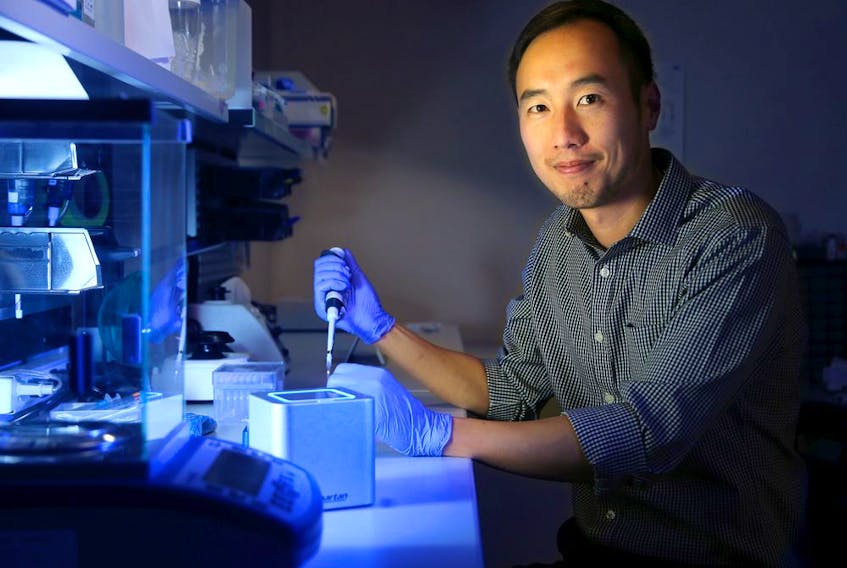On May 1, Spartan Bioscience founder Paul Lem was in the midst of a once-in-a-lifetime company expansion. Then he slammed into reality.
In the previous two months, his scientists had re-engineered his firm’s portable DNA analyzer, the Spartan Cube, to do tests for the virus that caused COVID-19. Lem had secured Health Canada approval for the device on April 13 and promptly secured orders for two million test cartridges from Ontario, Quebec, Alberta and the federal government. Spartan shipped more than 5,000 test kits for validation.
Lem’s ambition is huge. He had also lined up a large-volume contract manufacturer from Toronto, one capable of pumping out hundreds of thousands of test cartridges every week by mid-July — roughly equivalent to the number of COVID-19 tests performed at hospitals and government labs across the entire country last week.
But on May 1, Lem learned that the National Microbiology Laboratory was not impressed with the “efficacy” of the swabs Spartan used to collect samples of SARS-CoV-2 — the virus that causes COVID-19.
The following day, Health Canada restricted the use of the Spartan Cube to “research only.” Lem said he would recall the test kits to perform “additional clinical studies to assess the sampling method and proprietary swab.”
Just like that, Canadians learned they would have to wait longer for a COVID-19 test that promised to produce results in less than 45 minutes. The Spartan Cube had been billed as a vital tool in screening front-line health workers, border guards and members of remote communities without access to government labs.
Will the setback be temporary? It’s not certain, because neither Lem nor Health Canada is making clear the nature of the problem.
We do know swabbing for DNA is no simple matter. Health Canada and other regulatory authorities spell out what materials must be used for both the swab and attached shaft. Different types of swabs are required depending on whether DNA samples are collected from the back of the throat or different parts of the nose. Spartan describes its test as “non-invasive.”
The swab must be capable of efficiently capturing enough SARS-CoV-2 nucleic acid to isolate, transform and then amplify it through a polymerase chain reaction. The DNA is then sequenced to determine if the COVID-19 illness was caused by the SARS-CoV-2 virus.
Spartan Bioscience said the National Microbiology Laboratory’s report to Health Canada “indicated no concerns regarding the accuracy and analytical performance of Spartan’s test reagents (chemicals) and portable DNA analyzer device.”
That’s good news as far as it goes. But one of the great advantages of the Spartan Cube is that it serves as a kind of laboratory-in-a-box. All the parts must work together.
The aluminum Cube is made by Wistron Corp., a contract manufacturer in Taiwan, and there appear to be no issues with it. The swabs and cartridges are manufactured under contract by Stittsville-based L-D Tool & Die, with which Spartan has had long relations. An unnamed Toronto manufacturer had been tapped to handle the vast production expansion that was planned.
It’s not known whether the swab issue reflects a manufacturing or design flaw. L-D Tool & Die president Laurie Dickson and Spartan’s Lem both declined comment. While 14-year-old Spartan and L-D have plenty of experience designing and building DNA analyzers, their most recent history has been with DNA tests involving the bacteria that causes legionnaires’ disease.
In previous interviews, Lem had cited local production of swabs as a great plus, given the huge shortage of the product worldwide. The globe’s dominant supplier, Copan, despite being headquartered in the hard-hit Lombard region of Italy, has been operating flat out for months but unable to meet demand.
Nor does that situation look ready to change soon. The number of people confirmed to have tested positive for COVID-19 is racing towards four million worldwide. In Canada, the numbers of confirmed cases Monday topped 60,000.
And this data severely underestimates the incidence of COVID-19 because so many patients — including those with mild symptoms or none at all — are simply not being tested.
With provinces and states now opening up important sections of their economies, it’s more important than ever to be able to isolate those carrying the virus. The Spartan Cube is meant to be an important part of that effort, all the more so given its nearly unique ability to perform such tests quickly and remotely. Of course, it must do so accurately.
An army of health professionals is hoping Spartan’s issue with swabs turns out to be a straightforward fix. It’s just one more uncertainty in a world now full of it.
Related
Copyright Postmedia Network Inc., 2020








